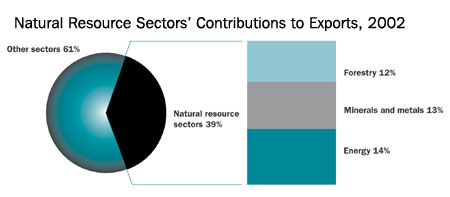ARCHIVED - Sustainable Development
Information Archived on the Web
Information identified as archived on the Web is for reference, research or recordkeeping purposes. It has not been altered or updated after the date of archiving. Web pages that are archived on the Web are not subject to the Government of Canada Web Standards. As per the Communications Policy of the Government of Canada, you can request alternate formats. Please "contact us" to request a format other than those available.
Sustainable Development Strategy
Moving Forward
Issues
Positioning Canada as a world leader on sustainable development
Natural Resources Canada has the federal responsibility to ensure the sustainable development of Canada’s natural resources; however carrying out this mandate requires that we look beyond our borders. Addressing the global issues that challenge Canada’s ability to create sustainable industries and communities requires both domestic action and our participation in developing international solutions in concert with the Department of Foreign Affairs and International Trade (DFAIT) and the Canadian International Development Agency (CIDA), which have the federal lead for foreign policy and international development assistance, respectively.
Many key issues impacting sustainable development cannot be addressed by one country acting alone; global issues require international solutions.
Canada is linked to the other countries of the world economically, socially, and environmentally. Our trade-dependent economy defines our prosperity in the context of global economic conditions and events. Imported environmental problems, such as acid rain and persistent organic pollutants, can damage our natural resources and impact the well-being of Canadians. Climate change poses significant threats to ecosystems and the health and safety of human populations worldwide. Our security is linked to regional inequities and conflicts involving countries that once seemed remote and unrelated to our national well-being.
It is clear that Canada has a stake in the sustainable development of the world, as well as a responsibility as a steward of significant natural resources. Further, Canada is a comparatively wealthy nation and a large per-capita resource user. It is in our best interest to adopt and implement sustainable development at home and promote it abroad. NRCan, with DFAIT and CIDA, plays a role in the development of international standards, policies and agreements through its participation in sector-specific international organizations and fora, and engages in initiatives to share best practices and approaches supporting the sustainable development of natural resources internationally.
Regional inequities can create pressures leading to unsustainable social and economic development; it is in Canada’s interest to assist developing countries in acquiring the capacity to develop their natural resources sustainably.
Poverty, political and social instability, and armed conflict can create intense pressures in the developing world to exhaust natural resources in order to finance conflict or meet immediate needs, or to proceed with ill-advised development projects which have long-term negative social and environmental consequences. The development and use of natural resources elsewhere can have detrimental effects on Canada’s environment and economy, by adding to global environmental problems or affecting commodities markets in which Canada competes. In some cases there may also be security implications affecting markets and increasing costs to Canadian businesses. In developing countries enjoying relative social and political stability there may be knowledge gaps or economic barriers to sustainable development that can be overcome with assistance.
Through sharing knowledge and best practices, and engaging in projects where Canadian knowledge and expertise is applied—for example, resource mapping and mine-site rehabilitation—NRCan assists developing nations in gaining the capacity to plan for and implement sustainable development. These activities are often also opportunities for showcasing Canadian excellence and innovation.
On the policy front, Canada advocates the effective engagement of developing countries in international fora where trade, environment and the advancement of sustainable development issues are negotiated and fostered. Participating in international dialogue provides the opportunity to raise awareness of Canadian values internationally, promoting our commitment to sustainable development and supporting the development of other countries, particularly those with significant economic activity in their natural resource sectors.

There are existing barriers to the international trade of natural resource products that negatively impact Canada’s economy.
NRCan’s commitment to the sustainable development of Canada’s natural resources includes optimizing social and economic benefits for Canadians while exercising environmental stewardship. Canada exports approximately $150 billion worth of energy, minerals and forest products every year, accounting for almost 40 percent of our exports. Trade barriers that deny Canadian products access to international markets are serious issues for Canada. Trade barriers deny opportunities to Canadian exporters, preventing Canadians from enjoying the benefits that could be derived from international trade of natural resource products. Denying industry sectors access to revenues from foreign trade can also result in slowing progress on innovation.
Some trade barriers are raised based on assessments which find that Canadian products are not suitable for importation based on selective environmental/social criteria. NRCan has an important role in investigating and assessing such findings. In some cases, taking specific actions in response to external criticism may be required. For example, the International Forestry Partnerships Program (delivered with DFAIT), an initiative of the Canadian Council of Forest Ministers, was created to counter widely publicized incomplete and biased information about Canada’s sustainable forest management policies and practices disseminated in Canada’s key export markets by environmental non-governmental organizations.
Canada’s natural resource industries are aggressively pursuing sustainable development and NRCan is supporting the private sector in this effort, but the journey is not over. As actors in international markets where there are few agreed global standards, but a great deal of criticism, Canadian governments and industry must work together to address criticisms levelled against Canadian products or producers.
Page details
- Date modified:


